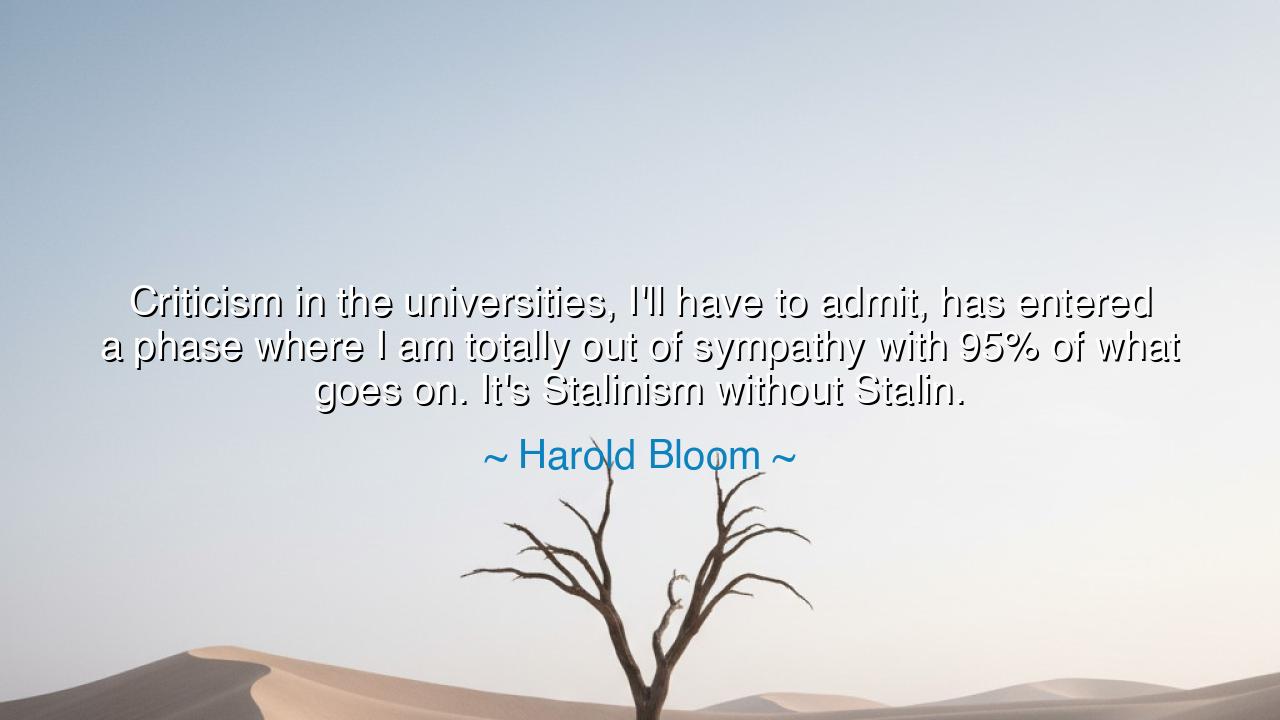
Criticism in the universities, I'll have to admit, has entered a
Criticism in the universities, I'll have to admit, has entered a phase where I am totally out of sympathy with 95% of what goes on. It's Stalinism without Stalin.






Hear now, O children of the future, the words of Harold Bloom, a scholar whose insight into the changing tides of criticism in the universities calls us to reflect deeply on the state of intellectual life: "Criticism in the universities, I'll have to admit, has entered a phase where I am totally out of sympathy with 95% of what goes on. It's Stalinism without Stalin." These words speak of a shift in intellectual culture, a shift that Bloom finds troubling. His use of the term Stalinism without Stalin is a powerful metaphor, suggesting that oppressive ideologies have crept into the academic world, yet without the clarity or purpose of tyranny. It speaks of an intellectual environment where freedom of thought is stifled not by the iron fist of a dictator, but by an ideological orthodoxy that suppresses independent thinking and free inquiry.
In the ancient world, O children, philosophers and thinkers like Socrates and Aristotle were revered not only for their contributions to knowledge, but for their courage in questioning the status quo. Socrates, the great Athenian philosopher, was sentenced to death for corrupting the youth of Athens. His crime was not in promoting anarchy or destruction, but in challenging the prevailing beliefs and demanding that people think for themselves. Socrates' life was a testament to the power of independent thought, to the necessity of questioning authority, and to the belief that truth is found not in conformity, but in individual exploration and debate. Bloom’s words echo this ancient struggle—when intellectual life becomes subject to a form of tyranny, even without the physical presence of a dictator, the very essence of free thought is compromised.
Stalinism—a regime of fear, control, and uniformity—was a period in history where dissent was crushed, where intellectual freedom was no more than a luxury for the powerful. Yet, Bloom suggests, this kind of intellectual oppression still exists in universities today, but it is more insidious. It is no longer a matter of dictatorship, but of ideological conformity, where ideas are not debated, but imposed. Just as the Athenian democracy once feared the influence of Socrates, so too do contemporary intellectual movements often resist the open exchange of ideas, seeking instead to enforce a narrow set of beliefs. Bloom's lament is that the free exchange of ideas—once the lifeblood of academic life—is being suffocated by the weight of ideological uniformity.
Take, for example, the rise of McCarthyism in the United States, when intellectuals were persecuted not by physical force, but through censorship, fear, and suspicion. Scholars who held dissenting views were silenced, labeled as un-American or subversive, simply because their ideas did not conform to the political orthodoxy of the time. Much like the Stalinist purges, the intellectual climate became one of conformity—an environment in which critical thought and open debate were replaced by fear and compulsion. Bloom’s criticism draws a parallel between these two eras: both are characterized by a stifling of ideas, even if one is done through physical force and the other through the subtle pressure of ideologies that demand adherence.
The lesson here, O children, is one of great importance: intellectual freedom is not simply a right, but a duty—a duty to question, to challenge, and to seek truth wherever it leads. Just as Socrates was condemned for daring to ask the uncomfortable questions, so too are we at risk of becoming complicit in our own intellectual confinement if we allow ideologies—whether from government, academia, or society—to dictate the boundaries of thought. Bloom’s warning is that the true spirit of intellectual inquiry lies in the willingness to confront ideas, to debate, and to listen to voices that may not agree with us. Without this freedom, we risk turning into mere followers of a set ideology, rather than independent seekers of truth.
In your own lives, O children, take this wisdom to heart. Be not afraid to stand alone in your beliefs, to question and analyze the world around you. Sympathize with the struggle for free thought and independent inquiry, for it is through this that progress is made. Embrace the discomfort that comes with challenging your own beliefs and seeking out those who think differently. In a world where ideological pressures often seek to suppress the free flow of ideas, you must become the guardians of intellectual freedom—the ones who keep debate alive, who preserve the courage to ask the difficult questions, and who value truth above conformity.
Let your lives be shaped by this ideal, O children: seek not to conform, but to expand the boundaries of thought. Like the great philosophers of old, question the world around you and seek the truth, wherever it may be found. For only through free thought and open debate can we arrive at a world that values wisdom and growth—a world where ideas are not suppressed, but celebrated. Keep the spirit of Socrates alive within you, and never let the chains of ideological conformity imprison your mind. In doing so, you will not only honor the ancient traditions of philosophy, but also help create a future where intellectual freedom remains unshackled and the search for truth is always pursued.






AAdministratorAdministrator
Welcome, honored guests. Please leave a comment, we will respond soon